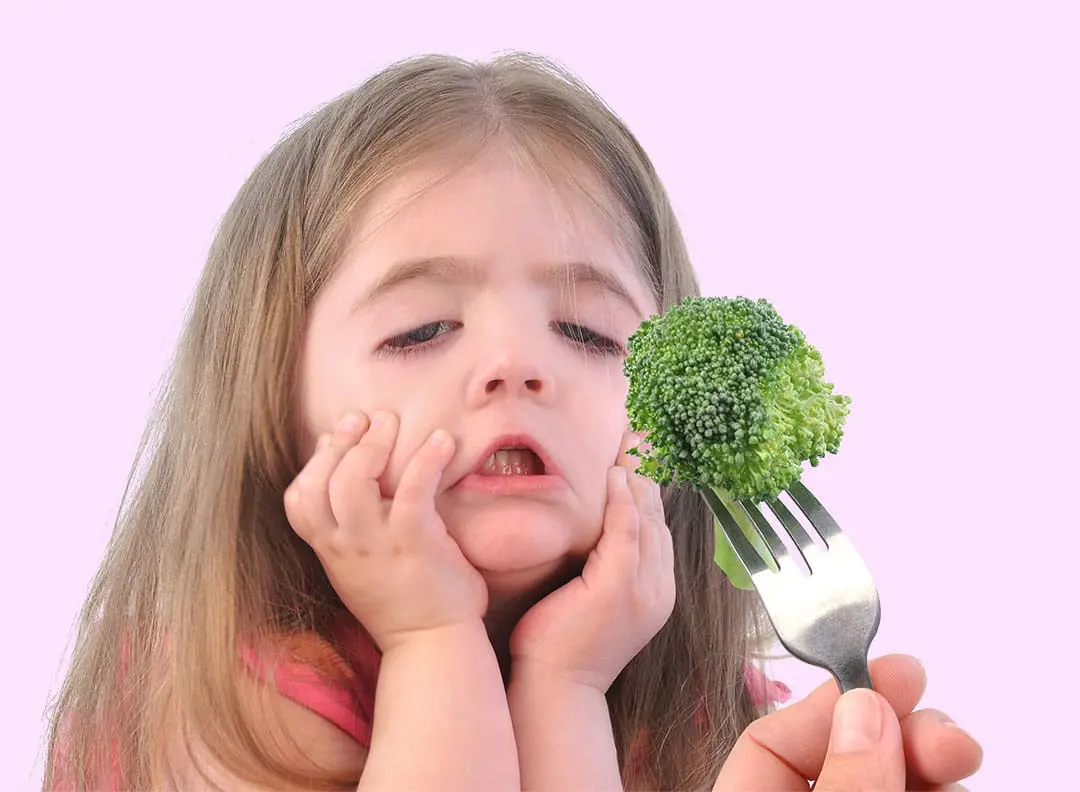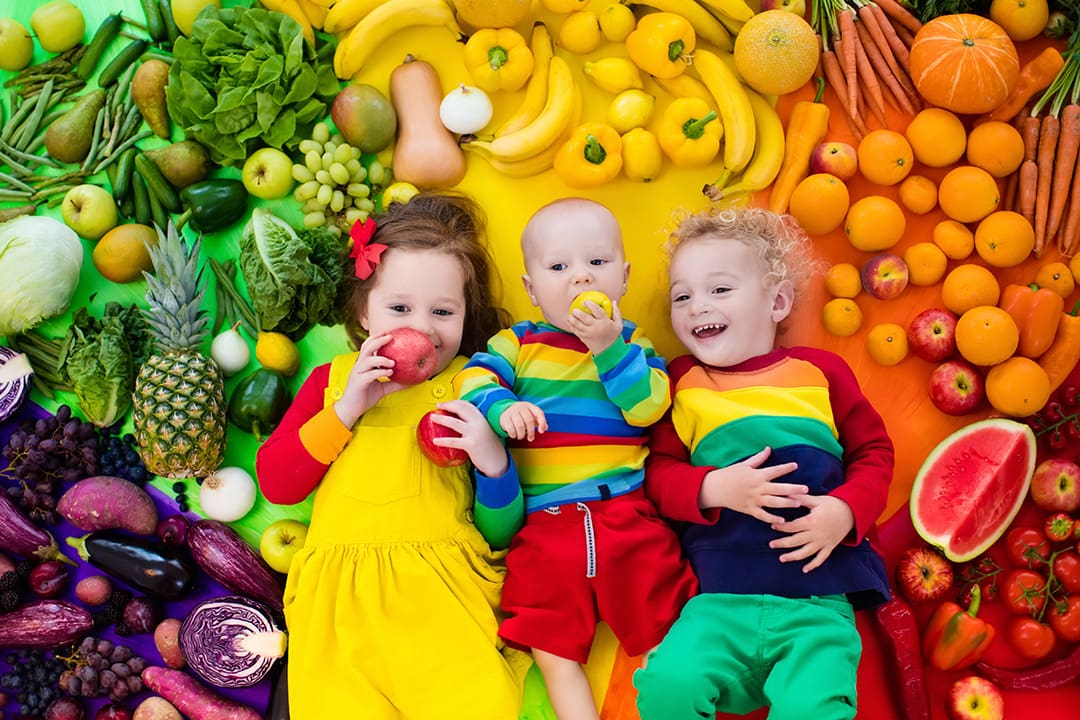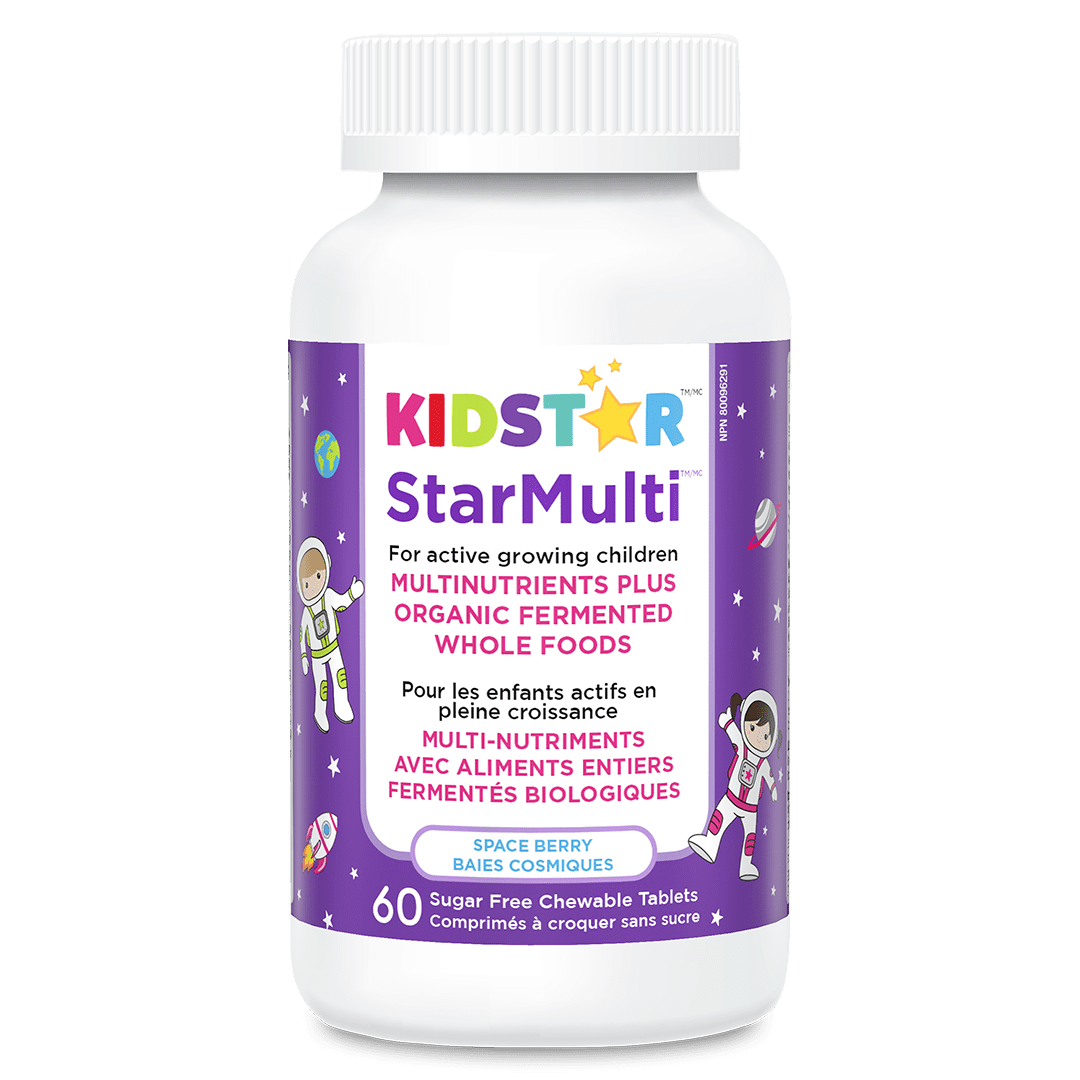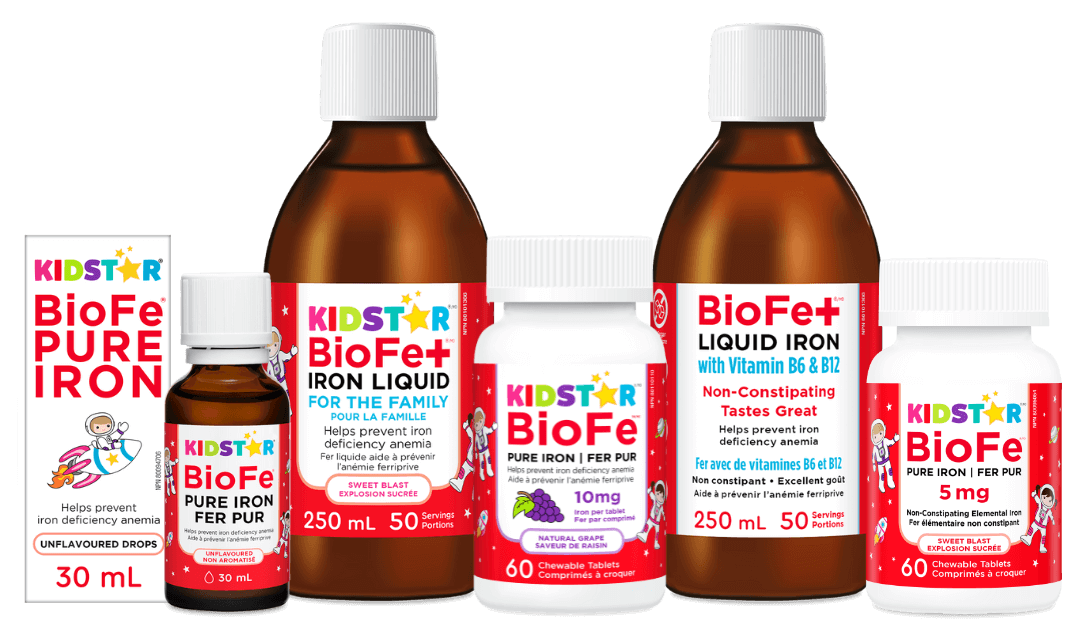Tips to Feed a Picky Eater

By Caitlyn Vanderhaeghe, B.A., B.Ed.
If you have a child who has limited his or her food choices to pasta with white sauce you may be dealing with a picky eater. When a toddler or young child refuses to eat certain foods or entire food groups we call this ‘picky eating’. It is not unusual for a young child to turn up their nose at foods especially when they are experiencing a food for the first time.
Children’s growing bodies require adequate amounts of vitamins, minerals, proteins, fats, and carbohydrates. Extreme picky eating can lead to both long- and short-term deficiencies and other health concerns like mood disorders and hyperactivity. Deficiencies in magnesium, iron, zinc, vitamin C, and B6 have been shown to have the biggest impact on mood, behaviour, and intelligence. Thankfully, most young children can be persuaded to try foods when we get creative.
Reasons for a Picky Eater
Your toddler’s taste buds have not yet been damaged by hot or spicy foods, making some tastes or flavours too intense. Other kids simply don’t like the texture of certain foods. Unfamiliar textures and flavours are not something they want to explore. Toddlers especially can be easily distracted at mealtime and may not want to sit long enough to eat all of the food on their plate. Sometimes your toddler is not hungry. A toddler’s appetite can vary day-to-day just as it can for adults. Be patient. Know that some days your toddler simply won’t want to eat what you’ve prepared.
Variety is the Way to a Toddler’s Tummy
It is important to start providing a variety of different foods early. If all you feed your infant is strained carrots, they might not develop a palate for other flavours and textures. Somewhere in the varied assortment of foods you provide there will be something your child will enjoy.

Offer the following foods and opt for organic whenever you can:
- A rainbow-coloured assortment of different fruits and vegetables.
- Protein sources like meat, yogurt, cheese, eggs, wild fish, humous, and protein shakes.
- Healthy fats from wild salmon, coconut butter, extra virgin olive oil, avocados, nuts and seeds.
- Whole grains like quinoa, millet, brown rice or whole grain pasta.
Get creative. Kids who won’t eat a vegetable plain, love to dip them in humous, guacamole or yogurt.
Try a variety of preparation methods to get your toddler interested in the food. Slice up fresh fruits into fun shapes. Cook vegetables in different ways, like roasting, steaming, boiling and mashing to overcome your toddler’s issues with texture. Stuck for recipe ideas? Check out our delicious protein recipes or Caitlyn’s blog for some fun recipes for kids.
Or, blend it! Smoothies are a great way to combine fresh fruit and veggies into an easy-to-eat form. And yes, you can ‘hide’ stuff like fatty acid rich oils, kale, spinach, and even cooked broccoli in a smoothie.
Kids Love to Cook
Include your kids from a very young age in preparing foods. It may take longer to get food on the table but children are more apt to try a food they have been involved in making. Even the pickiest eater is often proud of their food creations. Give them simple tasks like adding all the foods in the blender for a smoothie. Young children love to mash, mix and stir. They also like to eat with their hands. Finger foods can be eaten quickly, provide a tactile experience and may even keep a busy toddler in the chair longer at mealtime.
Children learn by example so if you don’t eat vegetables your child most likely won’t want to either.

Managing Nutritional Deficiencies
If picky eating is an ongoing issue, a good quality multivitamin with minerals or an all-in-one kid’s formulated protein powder can put your mind to rest. A children’s multivitamin is essential for smart, healthy children. They are nutritional insurance when you know your child is just not eating enough of the nutrient-rich foods they should. Multivitamins and minerals can be found in chewable tablets, or enriched protein powders that may also contain essential fatty acids.
Make sure you select a high-quality children’s supplement without added sugars, harmful fillers and additives, artificial colours or artificial flavours.

KidStar® StarMulti®
An example of a clean multivitamin is our KidStar® StarMulti®. Our chewable multivitamin StarMulti® uses the highest quality essential nutrients. StarMulti® is coloured with spirulina, flavoured with natural berries, sweetened with xylitol (which has been shown to remineralize dental cavities), and is free from unnecessary fillers.
Iron Deficiency Needs Special Attention
The daily maintenance dose of iron for children is 10mg per day. Iron deficiency is a common health concern in children made worse by selective or picky eating. Pull down your child’s lower eyelid and if the area is white or pale pink they should have their iron checked at the doctor or pediatrician to find out if your child is iron deficient or anemic.
If your child is iron deficient and refuses to eat good sources of iron, check out BioFe Iron available in many different supplement options from drops that can be added to food, yummy iron chewable tiny tablets, delicious no sugar liquids that do not cause constipation and are absorbable and easy on your child’s tummy (read more about how children become iron deficient). Our BioFe® Pure Iron also helps prevents tooth enamel from turning grey as occurs in other liquid iron supplements.

Common Symptoms of Deficiency
Healthy fats, protein, vitamins and minerals are all essential for a child’s growing brain and body. Too little of any of these nutrients can lead to a whole host of health and behaviour problems, including:
| Nutrient | Symptoms of Deficiency |
| Beta Carotene | Beta carotene transforms into vitamin A in the body. Increased infections, exercise-induced asthma, psoriasis, eczema, visual problems, dry eyes, night blindness. |
| Vitamin C | Rough, dry skin on arms (keratosis), slow wound healing, poor immunity, protection from neurotoxins. Humans cannot get enough vitamin C from food alone. A vitamin C deficiency has profound implications for mental wellness. |
| Vitamin D | Increased bone loss and fractures, rickets, poor immunity, multiple sclerosis, type 1 diabetes, wheezing, fatigue, certain types of cancer. One third of toddlers are deficient in vitamin D3. |
| Vitamin K | Bruise easily, wounds that bleed excessively, poor bone health. Vitamin K2 is needed for growth and development, to keep calcium in bones and for heart health. |
| Iron | Dark under eye circles, slow growth, attention and learning difficulties, tantrums, poor immunity, motor function, sleep problems, ADHD. Iron is essential for growth, development, emotional and cognitive status of young children. |
| Vitamin B12 | Tingling in the hands and limbs, weakness, delayed physical and mental development, irritability, neurological problems, seizures, lack of appetite. |
| Calcium | Rickets, muscle cramps, poor bone and dental development, brittle nails, stunted growth, confusion, seizures. |
| Magnesium | Constipation, difficulty sleeping, hyperactivity, anxiety, ADHD, muscle cramps or twitching. Magnesium is the most crucial nutrient for brain performance including IQ. Needed for serotonin, GABA and dopamine function. Over 40 percent of children are deficient. |
| Vitamin B6 | Increased colds and flu, low hemoglobin, behavioural problems, intelligence, ADHD. Vitamin B6 reduces hyperactivity, normalizes happy hormones, improves behaviour and is essential for cognition. |
| Zinc | Loss of appetite, stunted growth, poor immune function, poor wound healing and behavioural problems. Zinc deficiency is the most recognized deficiency linked to inattention and ADHD in children. It is critical in regulating serotonin (happy and sleep hormones). |
More Tips to Deal with Picky Eaters
- Be gentle but persistent. Don’t negotiate, punish or use food as a reward. It is important for your children to build a healthy relationship with food and eating. Forcing a child to eat something they don’t want may lead to resistance and food aversions.
- Listen to your child. If she says she is not hungry or doesn’t want to eat a particular item then drop the subject.
- Try, try and try again. Keep offering a variety of foods for your child to eat. It can take 10 to 15 attempts at introducing a new food before your child decides if he/she likes it. Start small. Ask your child to try one bite of new food and work your way up from there.
- Bring foods into the house that the entire family is allowed to eat. This removes any power struggles around who can have ice cream or not.
- Limit the number of snacks to 2-3 per day. Eliminate processed foods and provide snacks from whole, natural foods.
- Offer water only (not milk or juice) between meals and snacks.
- Set a good example. Show your child that you enjoy eating a variety of healthy foods. Eventually, a child’s curiosity may lead him or her to try something new!
- Supplement with a high-quality children’s multivitamin such as KidStar StarMulti
- Meals and snacks should be planned/structured at regular intervals. Your child will not eat a full meal if he/she is snacking/grazing every hour.
- Distractions should be avoided at mealtime. Toys should not be on the table and the television/iPad should be turned off. Parents should also have their phones turned off/removed during mealtime too. Mealtime is for eating together and interacting as a family.
- Only one meal should be prepared for the entire family. Your home is not a restaurant and you are not a short-order chef, so why would you prepare a completely separate/different meal for your child? That said, include one healthy side dish that your child does enjoy.
Find Kids’ Supplements Here
Complete multi vitamin and mineral formula with the highest quality essential nutrients.
StarMulti™
$34.99
Delicious chewable vitamin C from gentle magnesium ascorbate.
Vitamin C
$28.99

About the Author
Caitlyn Vanderhaeghe, B.A., B.Ed., is a health advocate, licensed teacher, and CEO of KidStar Nutrients. Caitlyn’s experience spans more than a decade of supply chain and ingredients sourcing in the natural products industry. As a mother of three daughters, Caitlyn’s mission is to help educate parents about kids’ nutrition and provide clean nutrients for kids and families.
